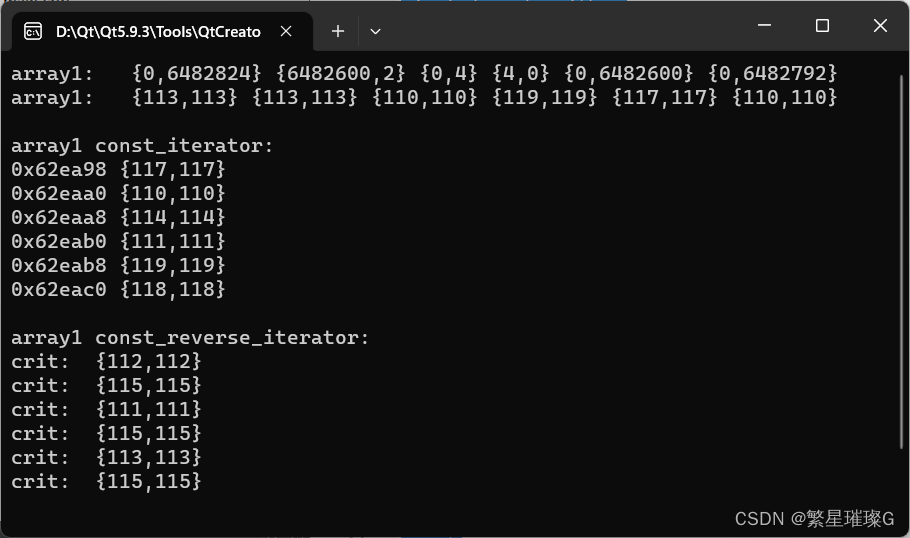定义于头文件 <array>
| template< class T, |
(C++11 起 |
std::array 是封装固定大小数组的容器。
此容器是一个聚合类型,其语义等同于保有一个 C 风格数组 T[N] 作为其唯一非静态数据成员的结构体。不同于 C 风格数组,它不会自动退化成 T* 。它能作为聚合类型聚合初始化,只要有至多 N 个能转换成 T 的初始化器: std::array<int, 3> a = {1,2,3}; 。
该结构体结合了 C 风格数组的性能、可访问性与容器的优点,比如可获取大小、支持赋值、随机访问迭代器等。
std::array 满足容器 (Container) 和可逆容器 (ReversibleContainer) 的要求,除了默认构造的 array 是非空的,以及进行交换的复杂度是线性,它满足连续容器 (ContiguousContainer) (C++17 起)的要求并部分满足序列容器 (SequenceContainer) 的要求。
当其长度为零时 array ( N == 0 )有特殊情况。此时, array.begin() == array.end() ,并拥有某个唯一值。在零长 array 上调用 front() 或 back() 是未定义的。
亦可将 array 当做拥有 N 个同类型元素的元组。
迭代器非法化
按照规则,指向 array 的迭代器在 array 的生存期间决不非法化。然而要注意,在 swap 时,迭代器将继续指向同一 array 的元素,并将改变元素的值。
迭代器
返回指向容器第一个元素的迭代器
std::array<T,N>::begin, std::array<T,N>::cbegin| iterator begin() noexcept; |
(C++17 前) | |
| constexpr iterator begin() noexcept; |
(C++17 起) | |
| const_iterator begin() const noexcept; |
(C++17 前) | |
| constexpr const_iterator begin() const noexcept; |
(C++17 起) | |
| const_iterator cbegin() const noexcept; |
(C++17 前) | |
| constexpr const_iterator cbegin() const noexcept; |
(C++17 起) |
返回指向容器首元素的迭代器。
若容器为空,则返回的迭代器将等于 end() 。

参数
(无)
返回值
指向首元素的迭代器。
复杂度
常数。
返回指向容器尾端的迭代器
std::array<T,N>::end, std::array<T,N>::cend| iterator end() noexcept; |
(C++17 前) | |
| constexpr iterator end() noexcept; |
(C++17 起) | |
| const_iterator end() const noexcept; |
(C++17 前) | |
| constexpr const_iterator end() const noexcept; |
(C++17 起) | |
| const_iterator cend() const noexcept; |
(C++17 前) | |
| constexpr const_iterator cend() const noexcept; |
(C++17 起) |
返回指向容器末元素后一元素的迭代器。
此元素表现为占位符;试图访问它导致未定义行为。

参数
(无)
返回值
指向后随最后元素的迭代器。
复杂度
常数。
返回指向容器最后元素的逆向迭代器
std::array<T,N>::rbegin, std::array<T,N>::crbegin| reverse_iterator rbegin() noexcept; |
(C++17 前) | |
| constexpr reverse_iterator rbegin() noexcept; |
(C++17 起) | |
| const_reverse_iterator rbegin() const noexcept; |
(C++17 前) | |
| constexpr const_reverse_iterator rbegin() const noexcept; |
(C++17 起) | |
| const_reverse_iterator crbegin() const noexcept; |
(C++17 前) | |
| constexpr const_reverse_iterator crbegin() const noexcept; |
(C++17 起) |
返回指向逆向容器首元素的逆向迭代器。它对应非逆向容器的末元素。

参数
(无)
返回值
指向首元素的逆向迭代器。
复杂度
常数。
返回指向前端的逆向迭代器
std::array<T,N>::rend, std::array<T,N>::crend| reverse_iterator rend() noexcept; |
(C++17 前) | |
| constexpr reverse_iterator rend() noexcept; |
(C++17 起) | |
| const_reverse_iterator rend() const noexcept; |
(C++17 前) | |
| constexpr const_reverse_iterator rend() const noexcept; |
(C++17 起) | |
| const_reverse_iterator crend() const noexcept; |
(C++17 前) | |
| constexpr const_reverse_iterator crend() const noexcept; |
(C++17 起) |
返回指向逆向容器末元素后一元素的逆向迭代器。它对应非逆向容器首元素的前一元素。此元素表现为占位符,试图访问它导致未定义行为。

参数
(无)
返回值
指向末元素后一元素的逆向迭代器。
复杂度
常数。
调用示例
#include <iostream>
#include <string>
#include <iterator>
#include <algorithm>
#include <functional>
#include <time.h>
#include <array>
using namespace std;
struct Cell
{
int x;
int y;
Cell() = default;
Cell(int a, int b): x(a), y(b) {}
Cell &operator +=(const Cell &cell)
{
x += cell.x;
y += cell.y;
return *this;
}
Cell &operator +(const Cell &cell)
{
x += cell.x;
y += cell.y;
return *this;
}
Cell &operator *(const Cell &cell)
{
x *= cell.x;
y *= cell.y;
return *this;
}
Cell &operator ++()
{
x += 1;
y += 1;
return *this;
}
bool operator <(const Cell &cell) const
{
if (x == cell.x)
{
return y < cell.y;
}
else
{
return x < cell.x;
}
}
bool operator >(const Cell &cell) const
{
if (x == cell.x)
{
return y > cell.y;
}
else
{
return x > cell.x;
}
}
bool operator ==(const Cell &cell) const
{
return x == cell.x && y == cell.y;
}
};
std::ostream &operator<<(std::ostream &os, const Cell &cell)
{
os << "{" << cell.x << "," << cell.y << "}";
return os;
}
using namespace std;
int main()
{
std::cout << std::boolalpha;
std::mt19937 g{std::random_device{}()};
srand((unsigned)time(NULL));
auto generate = []()
{
int n = std::rand() % 10 + 110;
Cell cell{n, n};
return cell;
};
//遵循聚合初始化的规则初始化 array (注意默认初始化可以导致非类的 T 的不确定值)
std::array<Cell, 6> array1;
std::cout << "array1: ";
std::copy(array1.begin(), array1.end(), std::ostream_iterator<Cell>(std::cout, " "));
std::cout << std::endl;
std::generate(array1.begin(), array1.end(), generate);
std::cout << "array1: ";
std::copy(array1.begin(), array1.end(), std::ostream_iterator<Cell>(std::cout, " "));
std::cout << std::endl;
std::cout << std::endl;
//返回指向容器首元素的迭代器。若容器为空,则返回的迭代器将等于 end() 。
//返回指向容器末元素后一元素的迭代器。此元素表现为占位符;试图访问它导致未定义行为。
for (std::array<Cell, 6>::iterator it = array1.begin(); it != array1.end(); it++)
{
*it = generate();
}
std::cout << "array1 const_iterator: " << std::endl;
for (std::array<Cell, 6>::const_iterator cit = array1.cbegin(); cit != array1.cend(); cit++)
{
std::cout << cit << " " << *cit << std::endl;
}
std::cout << std::endl;
//返回指向逆向容器首元素的逆向迭代器。它对应非逆向容器的末元素。
//返回指向逆向容器末元素后一元素的逆向迭代器。
//它对应非逆向容器首元素的前一元素。此元素表现为占位符,试图访问它导致未定义行为。
for (std::array<Cell, 6>::reverse_iterator rit = array1.rbegin(); rit != array1.rend(); rit++)
{
*rit = generate();
}
std::cout << "array1 const_reverse_iterator: " << std::endl;
for (std::array<Cell, 6>::const_reverse_iterator crit = array1.crbegin(); crit != array1.crend(); crit++)
{
std::cout << "crit: " << " " << *crit << std::endl;
}
std::cout << std::endl;
return 0;
}输出
